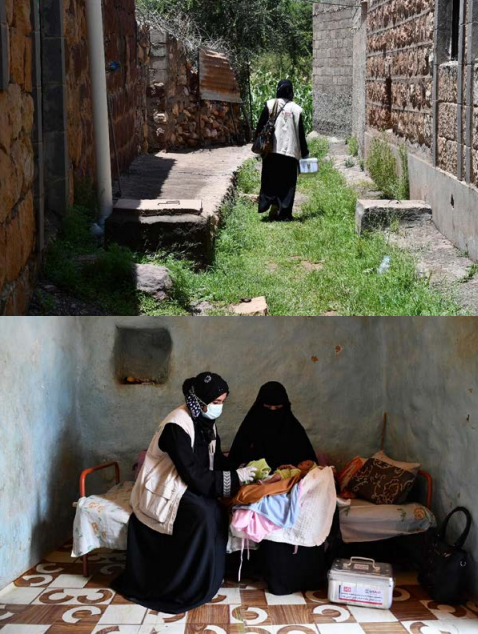.tmb-768v.png?Culture=en&sfvrsn=54737d84_1)
Implementation of community-based services in Yemen
Author
World Health Organization
This action brief is extracted from the series of key action briefs on “maintaining the provision and use of services for maternal, newborn, child and adolescent health and older people during the COVID-19 pandemic” published by the WHO Department of Maternal, Newborn,Child and Adolescent Health and Ageing. To access the series, please click here.
This brief was developed using information collected from existing documents as well as information captured through discussions with key institutional stakeholders. The views in this brief do not necessarily represent the decisions, policy or views of the World Health Organization.
Country
Yemen
Key learning points
• Successful implementation of community-based services could be achieved through well-designed needs assessment, tailored interventions, linkages with relevant governmental bodies, ongoing supportive supervision and monitoring and evaluation for learning.
• The role of community health workers needed to be consistently strengthened so that they could be prepared to continue providing services during disruptions including diseases outbreaks, natural disasters, and conflict situations.
• Community midwives and community reproductive health volunteers needed to work as a team and be linked with local health authorities, meeting regularly to discuss the challenges and needs of the community.
• Supportive supervision visits were vital to ensure that community midwives and community reproductive health volunteers provided quality services in the community. Their services were strengthened by ensuring they had job aids and treatments and consumables for the provision of services such as contraceptive pills, child health treatments, etc.
• It was necessary to strengthen the health management information system and the availability of registers for all community midwives to note the type and number of services provided to the community.
Background
Yemen reported its first confirmed case of COVID-19 on 10 April 2020 with the peak in the number of cases seen by June 2020. By the last quarter of 2020 the number of cases declined. There was another surge in COVID-19 cases later in 2020, although of a lower magnitude.
Yemen faced the COVID-19 pandemic with a health system hollowed out by years of conflict which had reduced the health workforce. With just 10 health workers per 10 000 population, Yemen is well below the international standard of 41 per 10 000. In addition, with nearly one half of the country’s health facilities either damaged or destroyed, basic health needs cannot be ensured. Community-based approaches have been identified as an important intervention in the Yemen context to meet unmet health needs, particularly in rural areas.
To support the health system, a three-year (2019-2022) development project, the Systems, Health and Resiliency Project (SHARP), was initiated by the the United States Agency for International Development (USAID) with the aim of improving maternal and child health outcomes, increasing community engagement in the health sector and improving the resilience of Yemen’s health system in general. With the unexpected outbreak of COVID-19, SHARP was adapted to address the needs of the overburdened health system including a specific focus on the implementation of community-based approaches to maintaining essential services for reproductive, maternal, newborn and child health and nutrition (RMNCH+N) during COVID-19.

Photo credit: JSI, SHARP
Actions to maintain essential services and outcomes of the implementation
Activities began in September 2020. The implementation of activities was in three districts in each of three targeted governorates, chosen for their relatively stable operating environment, poor health indicators, functional or partially functional health facilities, and motivated local authorities.
The various approaches applied through SHARP and measures taken during the COVID-19 pandemic to support the provision and use of essential RMNCH+N services are as follows:
1. My Community, My Home approach to address newborn mortality and increase immunization coverage at the community level.
2. Strengthening the care of small and sick newborns including implementation of kangaroo mother care for preterm and low-birth-weight babies.
3. Preparing and updating RMNCH+N guidelines, job aids and assessment tools, with the development of the national referral guideline for safe motherhood.
4. Building the capacity of frontline health workers through training and orientation sessions covering areas such as the use of KoBo – a mobile data collection software; Referral Guideline for Safe Motherhood; and an updated community-based maternal, newborn and child health guideline.
5. Improving the quality of community health services through supportive supervision visits using the updated Reproductive Health Supportive Supervision Tool and the provision of midwifery kits to community midwives.
6. Strengthening the health information system starting with the assessment of the current information systems, identification of gaps as well as opportunities to strengthen the information system and the development of a strategic and operational plan for improving the routine system.
Challenges and adaptations for effective implementation during the COVID-19 pandemic
During COVID-19 pandemic, some of SHARP’s activities were suspended while others were delayed, due to COVID-19 response activities and understaffing. The Project took some measures to maintain implementation during the COVID-19 pandemic, including:
1. decreasing the number of participants in each training session, while increasing the overall number of training sessions;
2. using larger training venues to ensure physical distancing;
3. wearing of face masks and frequent hand sanitization;
4. sharing COVID-19 awareness messages during all SHARP activities;
5. adding COVID-19 awareness activities to community-based services, including messages and print materials on the importance of vaccination and other preventive measures for COVID-19;
6. including a session in all trainings, meetings and workshops on the importance of COVID-19 preventive measures.


